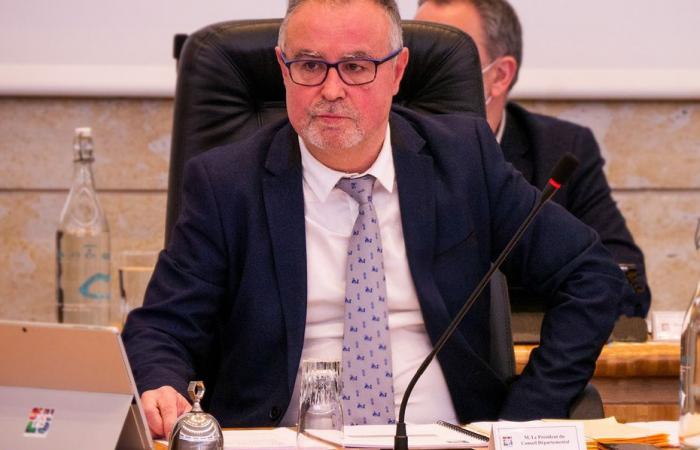To compensate for the savings efforts requested by the 2025 state budget, there is talk of increasing “notary fees”, in other words transfer taxes, a share of which goes to the departments. But not all department presidents are seduced by the idea. Philippe Dupouy, president of Gers, agreed to speak on the subject.
The essentials of the day: our exclusive selection
Every day, our editorial team reserves the best regional news for you. A selection just for you, to stay in touch with your regions.
France Télévisions uses your email address to send you the newsletter “The essentials of the day: our exclusive selection”. You can unsubscribe at any time via the link at the bottom of this newsletter. Our privacy policy
When a house, apartment or building is sold, the buyer must pay transfer taxes for valuable consideration (DMTO), also called “notary fees”. They are calculated as a percentage of the purchase price of the property and represent 2 to 3% for a new property, 7 to 8% for an old one. Transfer taxes constitute the majority of the amounts payable.
However, within the framework of the finance bill, local authorities are called upon to put their hands in their wallets to the tune of 5 billion euros. To cope, François Sauvadet, president of the Departments of France, proposes an increase in these taxes which return to the coffers of the departments. But not all department presidents are ready to take the plunge. The president of the Gers departmental council, Philippe Dupouy, answers our questions.
France 3: Would you agree with an increase in notary fees to bring in the missing money?
Philippe Dupouy: Let's say that I am waiting with great impatience for the market to recover. Even if there was a slight tremor which was very short-lived in September, there is no real recovery. When we ask real estate professionals or notaries, they say that they think that there should be a recovery in December and that the first half of 2025 will be a little better. But hey, we were told that the second half of 2024 would be better. I’m a little bit like Saint-Thomas…
Increasing DMTOs, or notary fees to speak in a trivial way, is one thing. But if we have a base that is weak, we can increase the levy rates for whatever we want, it does not have a significant impact on the finances of communities, particularly departmental communities. The market must recover. It is not so much the rate on which the levy is applied, it is rather the mass which is not there. And the mass of sales is only the market recovery that can generate it.
Obviously, if we increase rates a little, we will increase revenues a little. But if we compare ourselves to the year 2022, which was certainly a fairly strong year, but which also followed a few years of a good level of DMTO, we are still very, very far away. For example, for us, between 2022 and 2024, there is a loss of 14 million euros. 14 million euros out of 37 million, you can see the discrepancy a little!
France 3: Is this a really bad idea in your opinion?
Philippe Dupouy: Once again, I have no problem if we increase the tax rates, but it will only improve revenues a little. The increase in the rate is the buyer who will pay it. Notary fees are in addition to the value of the property to be paid. It is not at all certain that this does not have a negative effect on the desire to carry out a real estate transaction. The solution is that, first of all, the market returns, because the DMTOs are only pillars, certainly not insignificant, of the department's revenue. There are three pillars in plain language.
There is the overall operating allocation (DGF), which is an envelope allocated by the State. I would still like to remind you that between 2023 and 2024, the increase was 0.6%, that is to say 4 to 5 points less than inflation. So that means that somewhere, on this allocation, we have left some feathers. And then, there is a share of VAT that the departments recover, which is also linked to economic activity, which we know is not currently flourishing.
So, we, the department, need to have an economic recovery and we need to have a recovery in the real estate market, which are the two pillars, knowing that we have no illusions about the budget envelope. DGF.
France 3: Does this situation worry you?
Philippe Dupouy: Our recourse today is an economic recovery and a recovery in the real estate market that goes with it. We're waiting for that and if they don't happen, I'm very, very worried about the months and years to come. If the 2025 bill were adopted as is, which is likely – it's not political fiction, it can happen – there are 85% of departments which will have negative net savings at the end of 2025. We This is not about good management or bad management. It's structural.
The solution, very clearly, can only be achieved by the departments regaining fiscal autonomy. The housing tax was taken away from us, we no longer collect the tax. But tax has the characteristic of being dynamic, unfortunately, I would say, for the taxpayer.
But very clearly, the expenditure of the departments is, essentially, expenditure on allocations for solidarity in the broad sense, which is expenditure on which it is very difficult to intervene. Personally, I can't imagine for a single moment telling a Gers citizen that we can no longer pay them the personalized autonomy allowance, because we no longer have any money, for example. It doesn't exist.
France 3: We understand that it is indeed incompressible…
Philippe Dupouy: That's it, the difficulty is to have expenses which are, in quotes, “funded” through the solidarity missions carried out by the departments and random revenues. I would be for the return of the fiscal autonomy that we had and which allowed us in complicated times to be able to act on this lever. There, today, we no longer have any and we are caught and strangled through this finance bill.
What will the departments do? Reduce their sail in the sense of the actions which are carried out towards those administered and in particular on policies which are certainly optional, but which all make sense.
I'll give you just one example: the department of Gers has been committed, for 3 to 4 years, to trying to reduce the lack of doctors in its territory by paying doctors. It is an optional policy, but it has a cost and we do not know if we will have the capacity to maintain it.
And I'm talking to you about how it works. But what will suffer most from the lack of revenue is investment.
France 3: When you talk about investment, what concrete consequences does that mean for you?
Philippe Dupouy: If we, as departments, drastically reduce our investment, a part of the economy will fall, since we are 70% of the order givers. If the communities say “we no longer have money to invest”, that means that we are no longer renovating the colleges, we are going to reduce what we do on the roads, we are going to reduce the entire investment part in a way drastic. However, these are investments which, for the most part, return to the local economy because our projects are relatively modest, we use local companies.
This whole economy will suffer and behind it, there will be unemployment, people will fall a little further into precariousness. If we are no longer alongside other communities to invest, the municipalities and communities of municipalities, that means that they will no longer invest either.
If we are no longer alongside the associative environment, even if it is in a modest way, it's the same thing. These are time bombs that we are throwing on this entire social and economic aspect. In my office, I had the head of an association which offers a festival which generates 1.5 million euros in financial benefits over a 4-day weekend, who told me “if we no longer have public support, we are screwed, we have to close the door”. So that’s all that’s an issue.
I fear that if no solution is found, if there is no economic recovery, no recovery in the real estate market and the State continues to drain part of our revenue from us, we will generate a recession. Which would be terrible.






